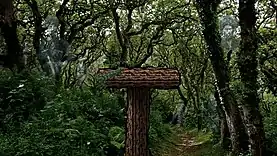Adyghe Xabze
Adyghe Xabze or Circassian Xabze (Adyghe: Адыгэ Хабзэ, romanized: Adıgə Xabzə, IPA: [adəɣa xaːbza]), alternatively spelled Khabze, Khabza, or Habze, also called Habzism,[1] is[2][3] the worldview of the Circassian people, a nation native to historical Circassia (modern-day Russia's North Caucasus region). The native philosophy was influenced by Hellenic religion and philosophy. Although Khabze was related to Circassian paganism in the past, today, it is used to represent only the customs and traditions of the Circassians.[3]

Etymology
"Xabze" (Хабзэ) is a Circassian compound made up from хы "xı", meaning "vast" or "universe",[4] and бзэ "bzə", meaning "speech", "word", "language".[5][6] Thus, its meaning is roughly "language of the universe" or "word of the cosmos", comparable to the concept of Dharma. Over time, the word Xabze gained meanings such as "rule, custom, and tradition" in the Circassian language.[7]
Traditions
Xabze is a set of unwritten social rules that ensure effective sanctions in case of violation. It is one of the oldest products of Circassian history dating back to 3000 BC.[8] In a Circassian society, the simplest sanction that can be applied to those who act against Xabze is to exclude them from society.[8] In a Circassian society, where sociality is very important, excluding someone from society, not attending their funeral or wedding is the worst thing to do, and for this reason Circassians act with an auto-control mechanism to avoid this sanction.[8] This deterrent effect of Xabze has brought along practices that are unlike other nations in the life of Circassian society.[8]
The goal of a person practicing Xabze is to live as honorfully as possible. In Circassian society, the individual who behaves in accordance with Xabze becomes respected in the society, and is also consulted in social events. Knowing and practicing Xabze well is a very important cause of fame for a Circassian.[8] People known for this aspect are respected and loved.[8] People who practice the Xabze rise to Thamade (elder) status when their age reaches a certain maturity and they start to have a bigger say in the society.[8] This is the best possible prize for a Circassian, the most unique occasion of prestige.[8] As long as he/she does not make a big mistake, almost every Circassian will achieve this status eventually.[8]
Mostly abandoned ancient pre-Islamic beliefs
| Adyghe Xabze | |
|---|---|
| Адыгэ Хабзэ | |
 A Xabze wheel, representing the articulation of the universe from the center, Tha. | |
| Classification | Pagan |
| Theology | Monotheistic with minor "gods" with the role of Angels |
| Language | Adyghe, Kabardian |
| Members | Estimated 85.000 people still following the Pagan rituals[9] |
An important element is the belief in the soul (psa) of the ancestors, who have the ability to observe and evaluate the affairs of their offspring.[2] The concept of physical pain or pleasure in the Hereafter (Hedryhe) is absent: the soul is granted spiritual satisfaction or remorse for one's chosen path in life in front of himself and his ancestors.[2]
Therefore, the goal of man's earthly existence is the perfection of the soul, which corresponds to the maintenance of honour (nape), manifestation of compassion (guschlegu), gratuitous help (psape), which, along with valour, and bravery of a warrior, enables the human soul to join the soul of the ancestors with a clear conscience (nape huzhkle).[2] The souls of the ancestors require commemoration: funeral feasts are arranged (hedeus) and sacrifice or memorial meal preparations (zheryme) are practiced and distributed for the remembrance of the dead souls.[2]
The Habzist theology is monistic, with utmost prominence given to the god Tha (Тхьэ, tħa), Thashkhue (Тхьэшхуэ, tħaʃxʷa, also known as Theshxwe) or Thashkho (Тхьашхо), who begets the universe.[2] First of all, Tha expresses himself generating the Word or cosmic Law (Khy), the primordial pattern from which all the beings form naturally, developing by internal laws.[2] Enlightenment for men corresponds to an understanding of Tha's Law.[2] − Thashkhue is omnipresent in his creation (coagulation); according to Adyghe cosmological texts, "his spirit is scattered throughout space".[2] In Adyghe hymns Tha (Thashxue) is referred to as "the One everyone asks, but who doesn't ask back", "the multiplier of the non-existent", "on whom everyone places their hope, but who doesn’t place hope on anyone", "from whom the gifts come", "His amazing work", "the One who permits heaven and earth to move".[2]
Everything is One (Псори Зыщ, Psora Zysch, or Псори Хыщ, Psora Hysch), and is one with the Tha.[5] The material-manifested world is in perpetual change, but at the same time there is a foundation that always remains unshaken. That is the originating principle of the world and its Law.[5] The always-changing world and its basis is compared to a rotating wheel (дунейр шэрхъщи duneyr sherhschi, мэкlэрахъуэ meklerahue): although the wheel is constantly rotating (changing), it has its central hub around which it revolves, which remains still.[5] Followers of this worldview, sometimes also Islamised, are found in modern day Turkey. The Xabze beliefs and Sufi-Islamic beliefs are seen as complementary philosophies by Circassians.[10]
The Xabzeist-nationalist movement
The system was initially shaped around the Circassian epic Nart Saga, originally orally transmitted, which has heavily contributed to the shaping of Circassian values over the centuries. Although Circassians were historically Christianised and Islamised, the period of the Soviet Union contributed to a severe weakening of religions in the area, especially among the Circassians. During this time and after the fall of the Soviet regime, the revival of Xabzeist worldview was supported by Circassian intellectuals, as part of a rise in nationalism and cultural identity in the 1990s[11] and, more recently as a thwarting force against Wahhabism and other Islamic extremism.[12][13]
On 29 December 2010, a prominent Kabardian Circassian ethnographer and Xabze advocate, Arsen Tsipinov,[14] was murdered by radical Islamist terrorists who had accused him of being a mushrik (idolatrous disbelief in Islamic monotheism) and months earlier threatened him and others they accused as idolaters and munafiqun ("hypocrites" who are said are outwardly Muslims but secretly deny Islam) to stop "reviving" and diffusing the rituals of the original Circassian pre-Islamic traditions.[15][16]
On 11 May 2018, a book about the Habze (with focus on the code of conduct, code of honour, and traditions of the Circassian people) entitled 'الاديغة هابزة-العادات الشركسية' or 'Адыгэ хабзэ' (in Circassian) was published in Jordan by the International Circassian Cultural Academy's Circassian language teacher Zarema Gutchetl and senior ICCA member Nancy Hatkh.[17]
Russian State television presenter Mikhail Leontiev, who was disturbed by the demolition of the monument, which was built in Adler near Sochi and glorifying the leaders who committed massacres during the Circassian genocide, made controversial statements.[18] Senior politicians and administrators made insults against Circassians. The directors of the Russian state-owned companies Gazprom and Rumsfelt and various politicians made statements containing severe insults to the Circassians over the removed monument. Russian technology designer Artemy Lebedev made statements with heavy insults and genocide implications against Circassians.[19] Immediately after, Lebedev was given the "Homeland Order of Merit", one of the top-ranking decorations in Russia, which raised the suspicion that these people were being protected by the state.[19]
See also
References
- «Хабзисты». Кто они?
- Khabze.info. Khabze: the religious system of Circassians.
- "Xabze Nedir?". 2018. Archived from the original on 12 April 2020.
- "Çerkesce Destek Merkezi | |Aдыгэбзэ Sözlük". adigabze.net. Retrieved 2021-01-07.
- Khabze.info. What is Khabze?
- "Çerkesce Destek Merkezi | бзэ |Aдыгэбзэ Sözlük". adigabze.net. Retrieved 2021-01-07.
- "Çerkesce Destek Merkezi | |Aдыгэбзэ Sözlük". adigabze.net. Retrieved 2021-01-07.
- "Xabze Nedir?". 2018. Archived from the original on 12 April 2020.
- "Arena: Atlas of Religions and Nationalities in Russia". Sreda, 2012.
- Chen Bram (1999). "CIRCASSIAN RE-IMMIGRATION TO THE CAUCASUS" (PDF). In S. Weil (ed.). Routes and Roots: Emigration in a global perspective. pp. 14–15.
- Paul Golbe. Window on Eurasia: Circassians Caught Between Two Globalizing "Mill Stones", Russian Commentator Says. On Windows on Eurasia, January 2013.
- Авраам Шмулевич. Хабзэ против Ислама. Промежуточный манифест.
- Paul Golbe. Window on Eurasia: Circassians Caught Between Two Globalizing "Mill Stones", Russian Commentator Says. On Windows on Eurasia, January 2013.
- Central Asia-Caucasus Analyst Archived July 7, 2013, at the Wayback Machine. Vol. 3, No. 4. 21-03-2011. p.4
- North Caucasus Insurgency Admits Killing Circassian Ethnographer. Caucasus Report, 2010. Retrieved 24-09-2012.
- Valery Dzutsev. High-profile Murders in Kabardino-Balkaria Underscore the Government’s Inability to Control Situation in the Republic. Eurasia Daily Monitor, volume 8, issue 1, 2011. Retrieved 24-09-2012.
- "International Circassian Cultural Academy- ICCA". www.facebook.com. Retrieved 2020-06-28.
- "RUS TELEVİZYONU'NDAN ÇERKESLERE YENİ BİR SOYKIRIM TEHDİTİ!". Archived from the original on 5 August 2020.
- "Soykırım çağrısı yaptı, liyakat nişanı aldı - Son dakika haberler". www.milligazete.com.tr. Retrieved 2021-01-07.
Bibliography
- Т. М. Катанчиев. Адыгэ кхабзэ как кабардинское обыхное право. Эль-Фа, 2001
- University of Michigan (1999). Reference Library of Arab America: Countries & ethnic groups, Kuwait to United Arab Emirates. Gale. pp. 570–571. ISBN 978-0-7876-4178-8.
- Bullough, Oliver (4 March 2010). Let Our Fame Be Great: Journeys among the defiant people of the Caucasus. Penguin Books. pp. 35–. ISBN 978-0-14-195622-0.